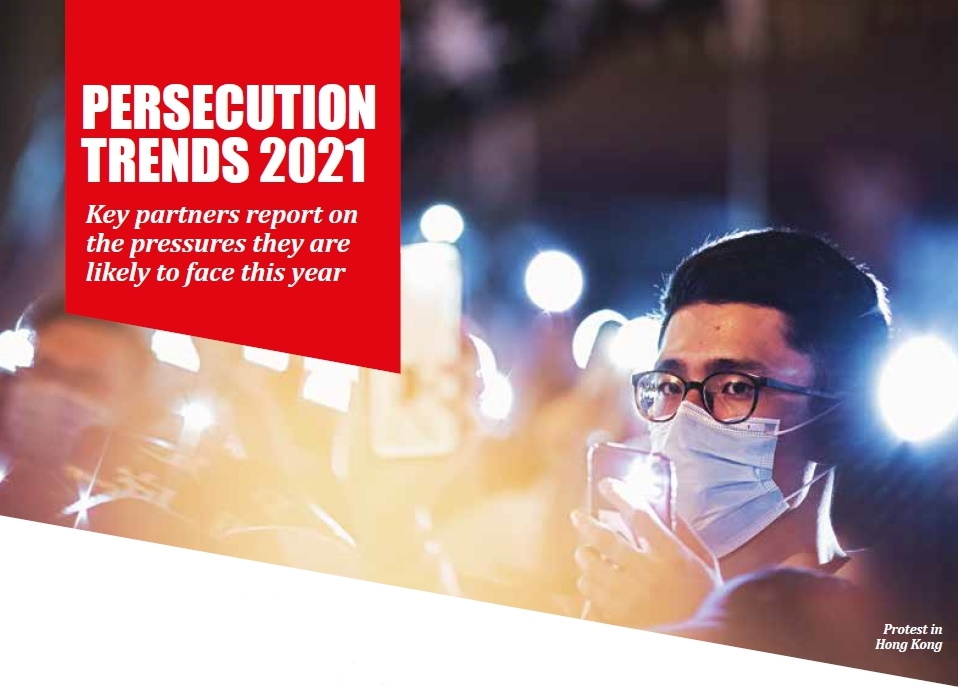
You can download a pdf of this report here.
Listen to our Persecution Trends podcast here.
AFRICA

NIGERIA
Throughout 2020, Release partners have reported on the continuing brutal attacks on Christian communities by militant Fulani herdsmen.
‘We have seen well-planned, well- orchestrated, systematic attacks on Christian communities that have nothing to do with a fight for grazing lands,’ said partner Rev Hassan John.
‘These attacks are driven by an Islamist ideology, aimed at destroying “the infidels” and, in many places, displacing them from their communities, while the government, by design or omission, turns a blind eye to the carnage‘.
‘The politically correct narrative which is easier for the international community to swallow – and which suits the Nigerian Government well – is to blame desertification and climate change.’
Release partner Mark Lipdo of Stefanos Foundation, said: ‘The failure of governance in Nigeria has led to increased criminality with impunity.’ As a result Christians have suffered increasing attacks, including robbery and kidnapping for ransom.
Unless the authorities hold perpetrators accountable, and take measures to protect vulnerable communities, we can expect attacks against Christians to continue throughout 2021.
ERITREA
Some 300 evangelical Christians remain detained without trial inside repressive Eritrea where all evangelical and pentecostal churches are banned. In 2020 more than 60 Christian prisoners were released, many of whom had been in jail for ten years or more.
‘However, we don’t see any change in government policy. God is the only hope for our country. Keep praying,’ said Release partner Dr Berhane Asmelash.
Persecution of Christians, repression, forced conscription and economic crisis will continue to force many Eritreans to flee to neighbouring countries as refugees in 2021.
KENYA
As in all locations, the coronavirus pandemic has severely limited the work of our Kenyan partner which serves believers from a Muslim background. ‘Covid 19 has paralysed us, bringing almost all our activities to a standstill,’ said our partner. ‘We couldn’t hold our monthly fellowship meetings, seminars and annual conferences. We could not travel.’
It reports that those who convert from Islam continue to face pressure and intimidation, as well as financial difficulties caused by Covid-19. These challenges will continue to impact persecuted Christians in the coming year.
EASTERN ASIA
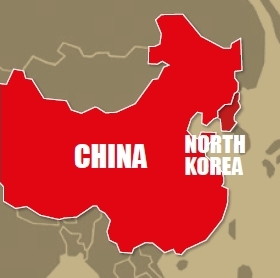
CHINA
‘The government of President Xi Jinping is increasing its “clean up” of anything that does not advance the communist agenda,’ reported one partner. ‘They appear to believe that they can achieve this by systematic opposition. They have bought freedom from censure due to many countries trading with China and regarding this trade as essential to their own economies.
‘Some non-registered churches were raided and closed in 2020. Increasing numbers of registered churches have had CCTV cameras installed in their church building as well as posters proclaiming communist ideals and beliefs.’
Our partner Bob Fu of China Aid has described how the government is exploiting Covid-19 to increase restrictions on underground believers.
‘The Chinese Government is trying every way to take advantage of the virus, by increasing the crackdown against Christian churches,’ he said. ‘It has accelerated particular campaigns, such as the forced demolition of crosses.’ Following the introduction of tough new rules controlling religion last year, persecution of Christians will continue in 2021.
NORTH KOREA
North Korea continues to prohibit all Christian activity. ‘The policy against Christians has remained steady since at least the 1950s – and is arguably the longest, harshest persecution of Christians in recorded history,’ said Dr Eric Foley, CEO of our associate ministry Voice of the Martyrs Korea.
‘It’s hard to lock down an underground church. Not even authorities hostile to the gospel plus a virus can accomplish that. Accordingly, underground Christians in North Korea have viewed the coronavirus as an act of God that opens new opportunities for them, and the concomitant grace and resources to meet the requirements of those opportunities. This has been the most creative year we have witnessed in the underground church to date.’
More Bibles sent
For example, during 2020, despite the restrictions of Covid-19, our partner provided Bibles for North Korean Christians – distributing double the number compared to the same period the previous year.
While persecution will remain in 2021, our partner asks: ‘Pray that the bold, patient Spirit of Christ which we see active in our underground church partners will be at work in us also.’
SOUTH ASIA
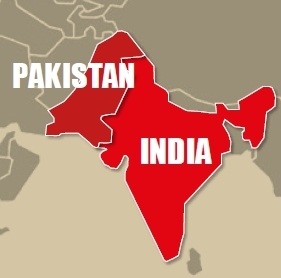
PAKISTAN
Last year the blasphemy laws continued to be widely misused against Christians and other minorities – often to settle personal scores. In addition, Release partners still report the abduction, rape, and enforced conversion and marriage of Christian girls.
In fact Pakistan’s Christians are likely to face oppression and discrimination throughout their lives: at work, at school and college, in accessing services and resources, and in the legal system. So persecution will continue in the coming year.
While some Christian workers were infected with Covid-19, and despite travel restrictions, our partners were able to provide food and medical assistance to vulnerable families.
INDIA
Christians and other minorities fear that Hindu nationalism and religious intolerance will continue to grow during 2021.
Hindu extremists attacked churches and individual believers throughout 2020. According to India’s Alliance Defending Freedom (ADF), Christians suffered 225 incidents of religiously motivated violence during the first ten months of 2020 – compared to 218 incidents in the same period in 2019. Many of these attacks were by vigilante mobs.
In September 2020, for example, Hindu extremists incited mobs of up to 3,000 people to attack Christians in three villages in Chhattisgarh state.
Since the BJP (Bharatiya Janata Party) took power in 2014 – and especially following the landslide victory of Prime Minister Narendra Modi in May 2019 – there has been a significant rise in the number of attacks against Christians.
The coronavirus has also affected persecuted Christians. ‘It has been a challenging task to reach out to the victims of violence during the outbreak of the pandemic,’ said Release partner the All India Christian Council. ‘A number of frontline workers were infected with Covid-19 during the second wave in the middle of 2020.’
SOUTH-EAST ASIA
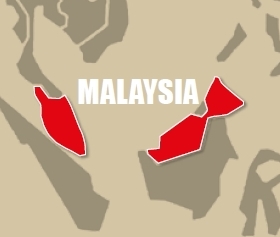
MALAYSIA
Although Malaysia’s constitution guarantees religious freedom, Sharia (Islamic law) often supersedes it. Consequently it is illegal to evangelise Malays, and apostasy laws make conversion illegal in all but one Malaysian state.
Believers from a Muslim background have experienced the greatest persecution, which is likely to increase in 2021. ‘We have more Sharia court cases, involving family law, more violent husbands throwing out their Christian wives, and neglected children caught in the middle of the battle,’ said our partner.
‘Persecution is definitely increasing. The newly formed government is using the outbreak of Covid for their purposes and has closed churches all over the country.’
During 2020 Release highlighted the disappearance of Pastor Raymond Koh who was abducted in a military- style operation in February 2017- and who has not been seen since.
CENTRAL ASIA
The states of Central Asia continue systematically to oppress Christians in a number of ways. ‘Evangelism is officially prohibited by law in all countries of the region – allowing believers the right only to confess their faith, but not to spread it,’ said our partner ‘Pavel’.
Most churches in the region must register with the authorities in order to hold Christian meetings – but this is often difficult or impossible for smaller congregations who do not have enough members to do so. Even registered churches that theoretically have the right to operate legally may be denied permission to buy or build church property.
In addition churches often have to provide personal data about their members. ‘Believers fear that this private information could easily fall into the hands of Islamist or criminal groups,’ said our partner.
‘Those who convert from Islam may be ridiculed and insulted, and are considered to be apostates and traitors,’ said Pavel. For all these reasons, oppression and persecution are likely to continue against Christians in Central Asia during the coming year.
MIDDLE EAST
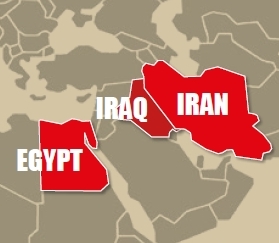
EGYPT
Egypt is home to one of the fastest growing populations in the Middle East and the largest Christian population in the Arab world. However, despite protection provided by the constitution, Christians will continue to suffer oppression and persecution during 2021. Most live as second-class citizens, experiencing discrimination in law, education and employment.
Converts from a Muslim background will continue to pay a high price for practising their Christian faith and will face the harshest treatment: such as expulsion from their families, divorce instigated by their spouses, estrangement from their children and loss of employment.
IRAQ
Our partners continue to support persecuted Iraqi believers (pictured) and Syrian refugees who have fled to the autonomous region of Kurdistan in the north of the country. Many of these believers have applied for asylum.
‘They still need help,’ said our partner Jamal. ‘In 2020 we provided food packages, housing, education and vocational training to hundreds of families fleeing war and persecution – and the numbers continue to rise.’ He expects there will be continuing need for support throughout 2021.
‘While Covid-19 has limited our movement, it has not stopped us from getting supplies to the needy in our region.’ In addition our partners have distributed Bibles and Christian literature.
‘We thank God for Release which has enabled us to help Christian refugees in northern Iraq since 2014. Thank you so much for your support, for encouragement and standing with us.’
IRAN
Christians in Iran have experienced persecution throughout the past year. ‘This is part of a campaign to stop the spread of Christianity, to arrest those who are leading house churches and those who are involved in evangelism and teaching,’ said our partner.
‘Persecution is on the increase because the authorities are aware of the growth in the number of converts and house churches and are determined at all costs to stem this. There is no doubt that the government is concerned that disillusioned Muslims are becoming Christians.
‘The very fear of persecution is a worry as believers meeting in their homes do not know if they are under surveillance or not. These pressures have led to an exodus of believers and Christian workers from Iran – and this is likely to continue in 2021.’
However, our partner reports that Covid-19 has created many new opportunities. For example, because of restrictions in travel, more believers have been regularly taking part in online meetings.
You can download a pdf of this report here.
Listen to our Persecution Trends podcast here.
You can download and read more stories from our latest magazine here.
You can signup to receive your FREE copy of Release magazine here.